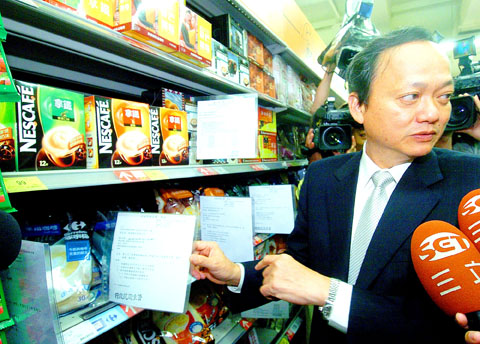By Shelley Huang Staff Reporter, with CNA
Department of Health Minister Yeh Ching-chuan (葉金川) told reporters yesterday that “no melamine detected” does not mean a product contains zero parts per million (ppm) of melamine, but rather that no melamine could be detected with the testing method used and that the product is “fit for consumption.”
In response to the recent controversy over whether the government had eased its standards on the permissible concentration of melamine from zero ppm to 2.5ppm, Yeh said a Cabinet-level inter-agency panel would discuss the definition of “standard” levels of melamine on Tuesday and seek to standardize testing procedures nationwide despite the fact that different testing instruments are available in different regions.

PHOTO: LU CHUN-WEI, TAIPEI TIMES
CERTIFIED LABS
The Department of Health (DOH) said the nation’s five laboratories certified for testing, including the Food Industry Research and Development Institute, had been working night and day to cope with the growing backlog of companies that need to have products tested.
The DOH said it planned to have another 16 labs certified by the Taiwan Accreditation Foundation to help with melamine testing.
The labs, when ready, will accept samples seven days a week, it said.
Yeh said yesterday that the DOH would meet local health authorities in 25 counties and cities tomorrow to coordinate inspection procedures.
On Tuesday, the DOH will contact experts in the US, Japan, Australia, New Zealand and the EU to collaborate on standard inspection procedures and setting a threshold for melamine detection, he said.
‘STRICTEST STANDARDS’
Yeh said the government was responsible for screening all imported foodstuffs and that all agencies, including the Bureau of Standards, Metrology and Inspection, the Bureau of Animal and Plant Health Inspection and Quarantine and the Bureau of Food and Drug Analysis would “apply the strictest screening standards.”
In response to a report in the Chinese-language Liberty Times (the Taipei Times’ sister newspaper) that customs personnel had not yet received lists of banned imports, Yeh said the task force had confirmed that instructions on banned products — including Chinese-made milk powder, other dairy products and vegetable-based proteins — had been issued as early as Tuesday.
Not one banned product has made it past Taiwan’s borders since, he said.
RANDOM CHECKS
Meanwhile the DOH said yesterday that it would step up its random examination of food products from countries with dubious food safety standards.
“We have targeted products from certain countries with questionable standards and we do not rule out the possibility of carrying out the strictest batch-by-batch examinations of suspect products,” Yeh said, declining to name any countries.
Asked to comment on the scandal involving Pizza Hut, Yeh said it was only one case and that the source of the tainted ingredients had yet to be identified.
Pizza Hut on Friday reported to the DOH that 65,000 packets of cheese powder contaminated with up to 76.2ppm of melamine may have been consumed by its customers.
Pizza Hut has since recalled all unused cheese packets.
To date, five cases of kidney stones have been reported nationwide that could be linked to melamine.

Chinese Nationalist Party (KMT) Chairman Eric Chu (朱立倫), spokeswoman Yang Chih-yu (楊智伃) and Legislator Hsieh Lung-chieh (謝龍介) would be summoned by police for questioning for leading an illegal assembly on Thursday evening last week, Minister of the Interior Liu Shyh-fang (劉世芳) said today. The three KMT officials led an assembly outside the Taipei City Prosecutors’ Office, a restricted area where public assembly is not allowed, protesting the questioning of several KMT staff and searches of KMT headquarters and offices in a recall petition forgery case. Chu, Yang and Hsieh are all suspected of contravening the Assembly and Parade Act (集會遊行法) by holding

PRAISE: Japanese visitor Takashi Kubota said the Taiwanese temple architecture images showcased in the AI Art Gallery were the most impressive displays he saw Taiwan does not have an official pavilion at the World Expo in Osaka, Japan, because of its diplomatic predicament, but the government-backed Tech World pavilion is drawing interest with its unique recreations of works by Taiwanese artists. The pavilion features an artificial intelligence (AI)-based art gallery showcasing works of famous Taiwanese artists from the Japanese colonial period using innovative technologies. Among its main simulated displays are Eastern gouache paintings by Chen Chin (陳進), Lin Yu-shan (林玉山) and Kuo Hsueh-hu (郭雪湖), who were the three young Taiwanese painters selected for the East Asian Painting exhibition in 1927. Gouache is a water-based

Taiwan would welcome the return of Honduras as a diplomatic ally if its next president decides to make such a move, Minister of Foreign Affairs Lin Chia-lung (林佳龍) said yesterday. “Of course, we would welcome Honduras if they want to restore diplomatic ties with Taiwan after their elections,” Lin said at a meeting of the legislature’s Foreign Affairs and National Defense Committee, when asked to comment on statements made by two of the three Honduran presidential candidates during the presidential campaign in the Central American country. Taiwan is paying close attention to the region as a whole in the wake of a

OFF-TARGET: More than 30,000 participants were expected to take part in the Games next month, but only 6,550 foreign and 19,400 Taiwanese athletes have registered Taipei city councilors yesterday blasted the organizers of next month’s World Masters Games over sudden timetable and venue changes, which they said have caused thousands of participants to back out of the international sporting event, among other organizational issues. They also cited visa delays and political interference by China as reasons many foreign athletes are requesting refunds for the event, to be held from May 17 to 30. Jointly organized by the Taipei and New Taipei City governments, the games have been rocked by numerous controversies since preparations began in 2020. Taipei City Councilor Lin Yen-feng (林延鳳) said yesterday that new measures by